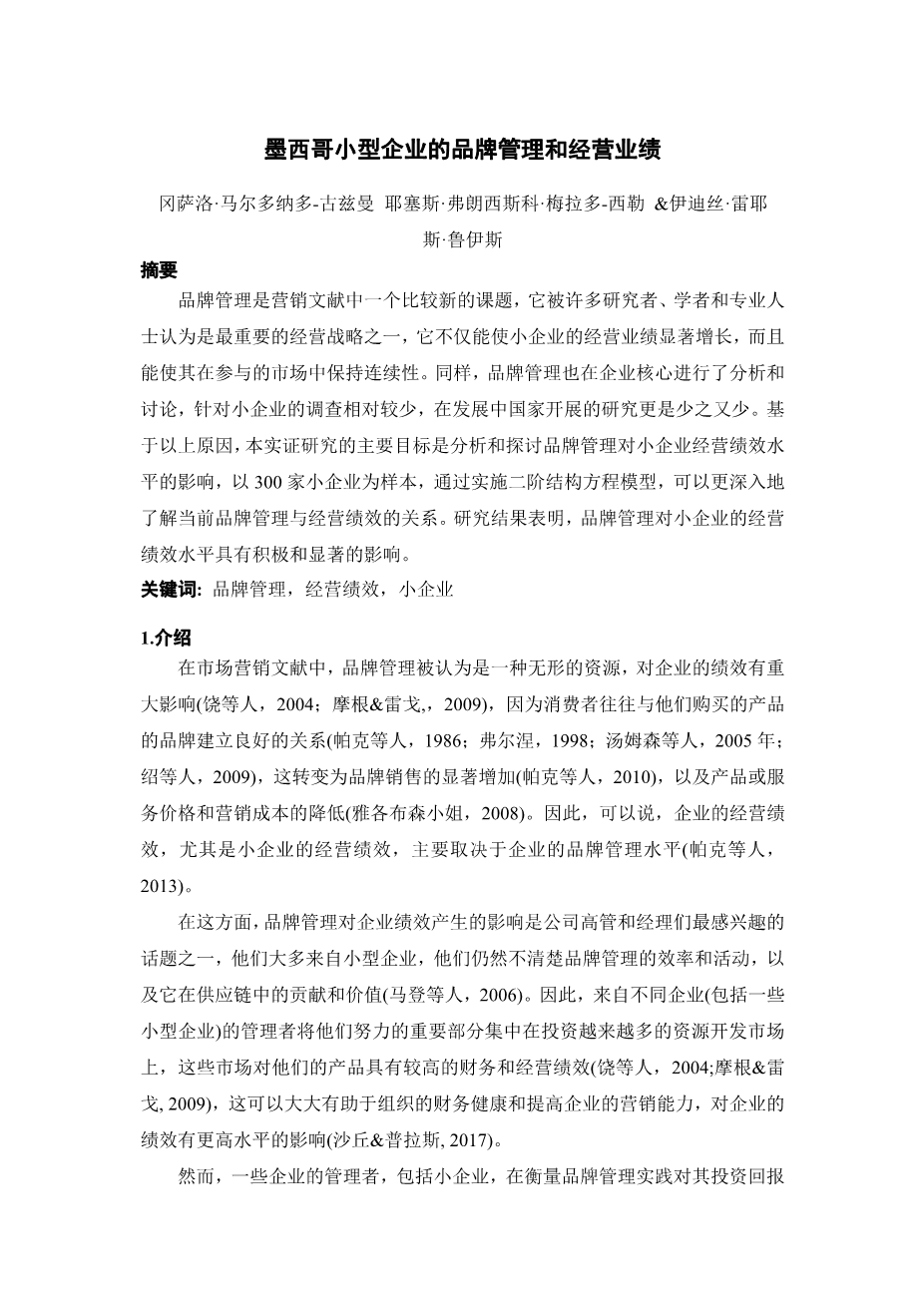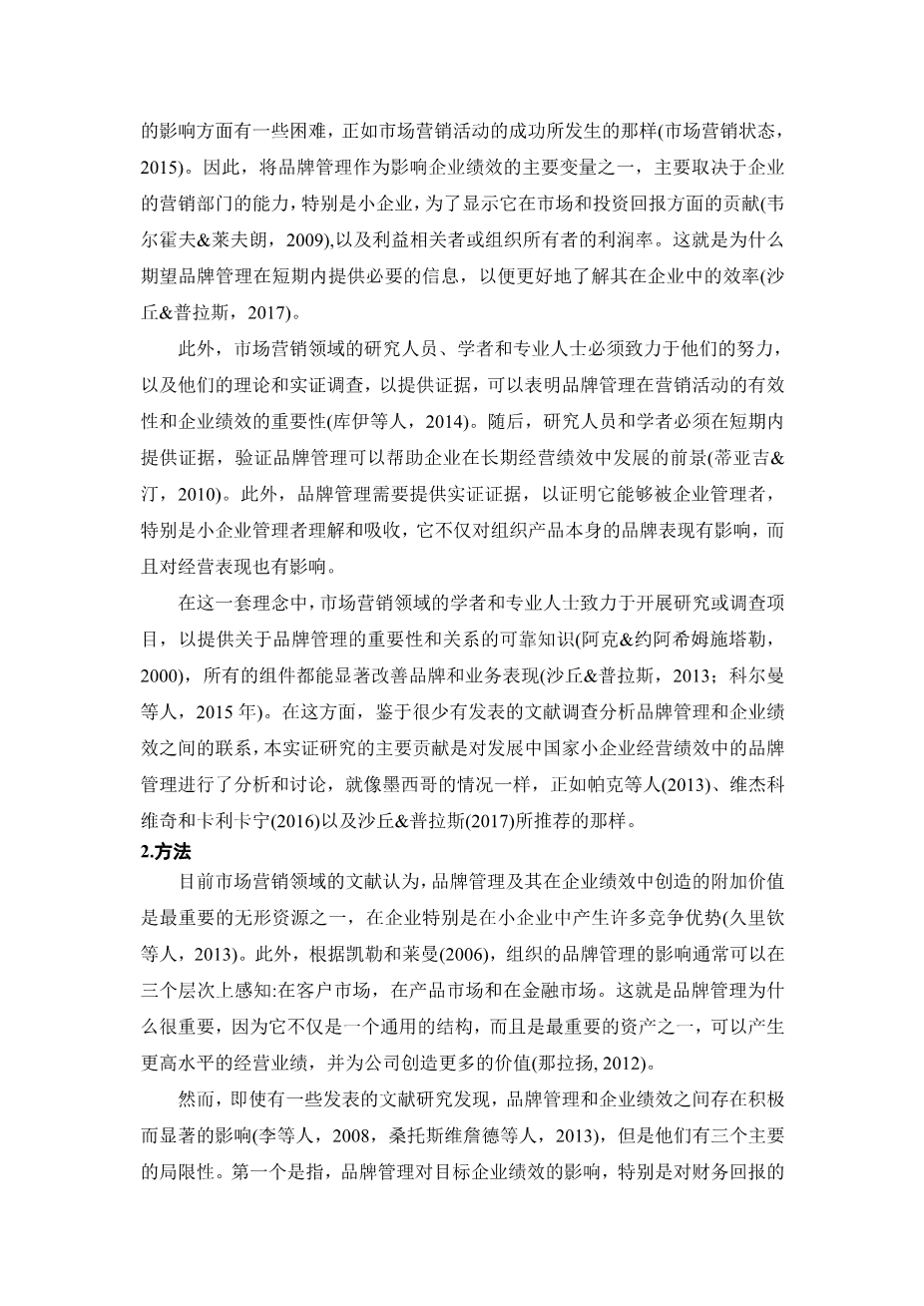Brand Management and Business Performance in Mexican Small
Business
Gonzalo Maldonado-Guzman, Jesuacute;s Francisco Mellado-Siller amp; Edith Reyes-Ruiz
Abstract
Brand management is a relatively new topic in marketing literature and it is considered by several researchers, academics and professionals, as one of the most important business strategies that allow not only a significant growth of the business performance of small enterprises, but also their continuity in the market where they participate. Similarly, brand management has also been analyzed and discussed at the core of enterprises and there are relatively few investigations that focus on small enterprises, and there are even less researches carried out in developing countries. For these reasons, the main goal of this empirical research is the analysis and discussion of the effects of brand management on the level of business performance in small enterprises, by using a sample of 300 small firms and by implementing a model of structural equations of second order, that can provide a deeper understanding of the current relation between brand management and business performance. The results obtained show that brand management has a positive and significant in the level of business performance in small enterprises.
Keywords: brand management, business performance, small business
1. Introduction
Brand management is considered in the marketing literature as an intangible resource that has a significant impact in business performance (Rao et al., 2004; Morgan amp; Rego, 2009), since consumers often establish a good relation with the brand of products they buy (Park et al., 1986; Fournier, 1998; Thomson et al., 2005; Schau et al., 2009), which turns into a significant increase in the sales of brands (Park et al., 2010), as well as a reduction in the prices of products or services and in the marketing costs (Mizik amp; Jacobson, 2008). Therefore, it is possible to state that the business performance, especially in small enterprises, depends mostly on the level of brand management that they have (Park et al., 2013).
In this regard, the impact created by brand management in the business performance is one of the most interesting topics among executives and managers of companies, mostly from small business, who still do not understand clearly the efficiency and the activities implied in brand management, as well as its contribution and value in the supply chain (Madden et al., 2006). For this reason, managers from different enterprises, including some small business, have focused an important part of their effort in investing more and more resources in the development of markets, that have a high level of financial and business performance for their products (Rust et al., 2004; Morgan amp; Rego, 2009), which could contribute significantly to the financial health of the organization and improve the marketing capacities of enterprises, that have a higher level of influence in business performance (Dunes amp; Pras, 2017).
However, several managers of enterprises, including small business, have some difficulties to measure the impact that brand management practices have in the return of their investments, just as it happens with the success of marketing activities (State of Marketing, 2015). As a result of this, the use of brand management as one of the main variables that influences in the business performance, will depend mostly on the ability of the marketing department in enterprises, especially in small business, to show the contribution that it creates in both the market and investment returns (Verhoef amp; Leeflang, 2009), as well as the profit margin for stake holders or owners of organizations. That is why it is expected that brand management provide the necessary information in a short-term in order to have a better understanding of its efficiency in enterprises (Dunes amp; Pras, 2017).
Additionally, researchers, academics and professionals in the field of marketing have to aim their efforts as well as their theoretical and empirical investigations to provide evidence that can show the importance of brand management in both the effectiveness of marketing activities and the business performance (Cui et al., 2014). Subsequently, researchers and academics have to provide in short-term evidence that verifies that brand management can help to the development of the perspectives of business performance in the long run (Tyagi amp; Sawhney, 2010). Furthermore, brand management needs to provide empirical evidence that it can be understood and assimilated by enterprise managers, especially those from small business, as well as its impact not only in the brand performance itself of the products of the organization but in the business performance as well. In this set of ideas, it is very important that researchers, academics and professionals in the field of marketing commit themselves to carry out studies or investigation projects that provide sound knowledge about the importance and relation of brand management (Aaker amp; Joachimsthaler, 2000), with all the components that improve significantly both the brand and business performance (Dunes amp; Pras, 2013; Coleman et al., 2015). In this regard, considering that are few published investigations in the literature that analyze the link between brand management and business performance, the main contribution of this empirical research is the analysis and discussion of brand management in the business performance of small business in a developing country, as it is the case of Mexico, just as recommended by Park et al. (2013), Veljkovic and Kalicanin (2016), as well as Dunes and Pras (2017).
2. Method
Brand management and the added value it creates in the business performance is considered in the current literature
剩余内容已隐藏,支付完成后下载完整资料


英语译文共 9 页,剩余内容已隐藏,支付完成后下载完整资料
资料编号:[605369],资料为PDF文档或Word文档,PDF文档可免费转换为Word
课题毕业论文、开题报告、任务书、外文翻译、程序设计、图纸设计等资料可联系客服协助查找。
您可能感兴趣的文章
- 饮用水微生物群:一个全面的时空研究,以监测巴黎供水系统的水质外文翻译资料
- 步进电机控制和摩擦模型对复杂机械系统精确定位的影响外文翻译资料
- 具有温湿度控制的开式阴极PEM燃料电池性能的提升外文翻译资料
- 警报定时系统对驾驶员行为的影响:调查驾驶员信任的差异以及根据警报定时对警报的响应外文翻译资料
- 门禁系统的零知识认证解决方案外文翻译资料
- 车辆废气及室外环境中悬浮微粒中有机磷的含量—-个案研究外文翻译资料
- ZigBee协议对城市风力涡轮机的无线监控: 支持应用软件和传感器模块外文翻译资料
- ZigBee系统在医疗保健中提供位置信息和传感器数据传输的方案外文翻译资料
- 基于PLC的模糊控制器在污水处理系统中的应用外文翻译资料
- 光伏并联最大功率点跟踪系统独立应用程序外文翻译资料



